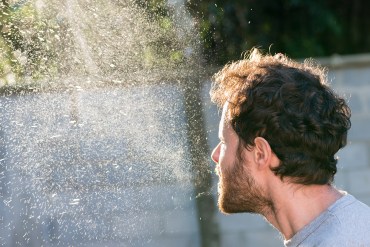What We Know About the Airborne Spread of the Coronavirus
The Centers for Disease Control and Prevention has gone back-and-forth on this issue. One thing remains clear: Though science is evolving, indications do point toward the potential for airborne transmission.
Post-COVID Clinics Get Jump-Start From Patients With Lingering Illness
Pop-up care facilities bring together a range of specialists to address the needs of patients who survive but continue to wrestle with COVID-19’s physical or mental effects, including lung damage, heart or neurological concerns, anxiety and depression.
Corralling the Facts on Herd Immunity
The term “herd immunity” has found its way into politicized discussions about how to overcome the COVID-19 pandemic. But what does it actually mean? And does it work?
Efforts to Keep COVID-19 out of Prisons Fuel Outbreaks in County Jails
Montana sheriffs say the state’s decision to halt prison transfers has led to overcrowding that makes it difficult to quarantine inmates and clean facilities.
Promises Kept? On Health Care, Trump’s Claims of ‘Monumental Steps’ Don’t Add Up
The president entered office seeking to overturn the Affordable Care Act, revamp Medicaid and drive down prescription drug prices, among other things. He’s hit some stone walls.
California Expands Privacy Protection to Public Health Workers Amid Threats
Democratic California Gov. Gavin Newsom expanded a confidential address program to public health officials in the wake of ongoing threats made against them tied to pandemic safety precautions such as masks and stay-at-home orders.
These Secret Safety Panels Will Pick the COVID Vaccine Winners
Data and safety monitoring boards work under a cloak of secrecy meant to prevent undue influence by stakeholders, such as companies or the government. In the Trump era, some worry the anonymity could actually invite it.
As Fires and Floods Wreak Havoc on Health, New Climate Center Seeks Solutions
The climate change center at UCLA’s Fielding School of Public Health plans to study and help implement policies for slowing climate change and adapting to it.
A Fair to Remember: County Fairs Weigh Risk of Outbreak Against Financial Ruin
The threat of COVID-19 forced many county fairs to cancel this year. But some rural communities that depend on the annual economic and cultural boost decided to go ahead despite a pattern of outbreaks.
How Families Are Keeping Halloween From Turning Into a COVID Nightmare
Parents are turning to spooky scavenger hunts, pumpkin-carving and movie nights as alternatives to trick-or-treating. Health professionals have their own advice on how to safely celebrate Halloween during the pandemic.
Reapertura de universidades generó 3,000 nuevos casos de COVID por día, según estudio
Los investigadores comprobaron que solo reabrir una universidad agregó 1.7 nuevas infecciones por día por cada 100,000 personas en un solo condado.
Colleges’ Opening Fueled 3,000 COVID Cases a Day, Researchers Say
In a draft study, researchers correlated cellphone data showing students’ back-to-campus movements and county infection rates to quantify how the coronavirus spread as colleges and universities reopened for the fall semester.
Native Americans Feel Double Pain of COVID and Fires ‘Gobbling Up the Ground’
Tribal leaders have worked to keep the coronavirus off their reservations because of its deadly impact on Native populations. But careful avoidance of the COVID virus has handcuffed the tribes as they face a devastating fire season.
Battle Rages Inside Hospitals Over How COVID Strikes and Kills
The debate over how the coronavirus spreads heated up Friday when the Centers for Disease Control and Prevention conceded that the virus spreads through tiny particles, but then took down guidance that could have forced big changes in hospitals.
It’s Not Just Insulin: Lawmakers Focus on Price of One Drug, While Others Rise Too
While insulin is the poster child for outrageous prescription costs, patients are paying ever more to treat depression, asthma, HIV, cholesterol and more. And the pandemic has overtaken efforts to force the issue in Congress.
Señales de una “vacuna sorpresa en octubre” alarma a científicos de carrera
El presidente Donald Trump, que parece decidido a anunciar una vacuna para COVID-19 antes de las elecciones, podría autorizarla legalmente a pesar de las objeciones.
Signs of an ‘October Vaccine Surprise’ Alarm Career Scientists
President Donald Trump has the legal power to authorize a COVID vaccine over the objections of the Food and Drug Administration and vaccine manufacturers. Such a move could further erode public trust in a vaccine and foist an unsafe shot on Americans.
Trump-Biden Race Could Hinge on How Florida’s Pinellas County Swings
Few places loom as large in the race for the White House as here in Pinellas County, the largest swing county in the ultimate swing state. And polls show that many people will have the pandemic and its public health and economic consequences on their minds when they cast their votes.
California’s Deadliest Spring in 20 Years Suggests COVID Undercount
California’s death count for the first five months of the pandemic was 13% higher than average for the same period during the prior three years. Subtract the deaths officially attributed to COVID-19 and experts say that still leaves scores of “excess” deaths among people of color that likely were mistakenly excluded from the coronavirus death tally.
Wildfires’ Toxic Air Leaves Damage Long After the Smoke Clears
As fires burn longer and closer to cities throughout the West, researchers are trying to understand the lasting health impacts by studying a Montana town previously smothered by wildfire smoke.

























